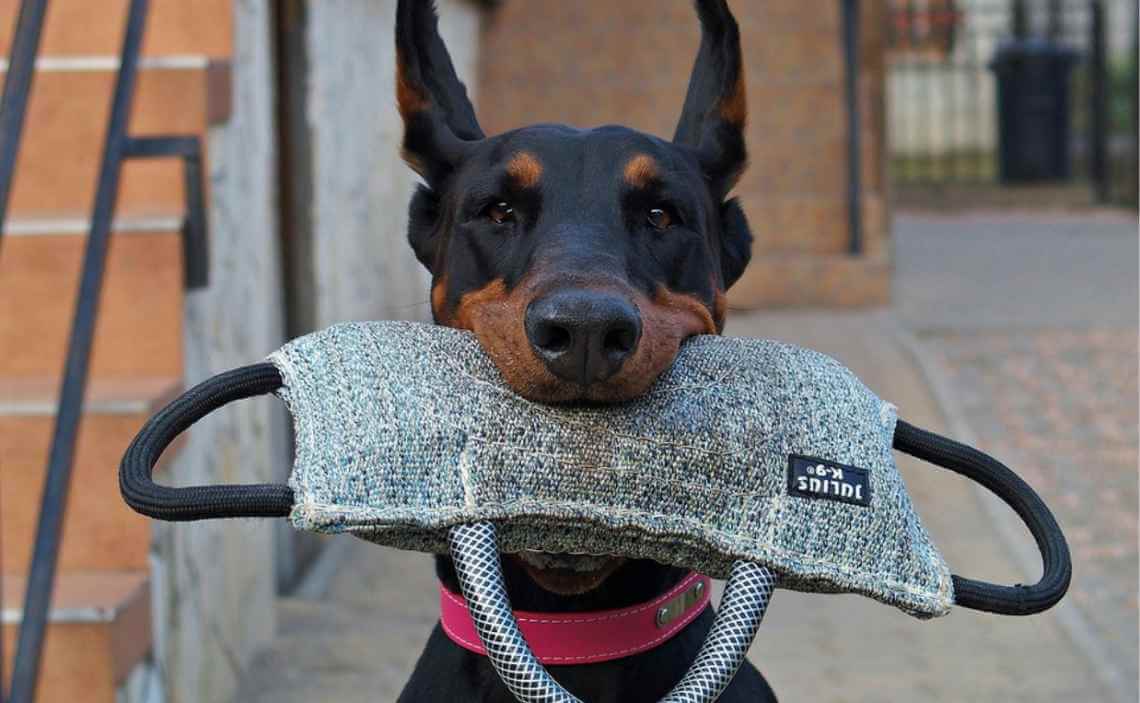
Dog owners love to think that their pup is the cutest, smartest, best behaved dog on the planet, right? But how do you tell if your pooch really is extra intelligent, as opposed to just normal “dog smart”?
A word of caution: be careful what you wish for. Having an extra-intelligent dog can actually have some downsides. Having an intelligent dog can be a bit tiring because you have to put in a lot of effort teaching a smart dog to make good choices and highly intelligent dogs needs lots of stimulation so they don’t become bored and get into trouble.
Different Types of Canine Intelligence
Like people, dogs have different types of intelligence, such as visual, auditory or tactile. Canine intelligence can be broken down into three groups:
-
Instinct intelligence
Instinct intelligence in dogs is derived from their breed. Guard dogs watch over things, retrievers fetch things, hounds track things, pointers sniff out birds and point them out and companion dogs are attuned to human social signals and respond to their owner’s moods to provide comfort.
-
Adaptive intelligence
Adaptive intelligence in dogs is a measure of how well an individual dog can learn. This includes learning and benefiting from the environment around the dog, solving new problems, etc. Adaptive intelligence can differ among individuals of the same breed.

-
Working intelligence
Working intelligence is based on what the dog can learn when instructed by people. This is important because the better your dog responds to your instruction, the more capable they are of performing utilitarian tasks. If you think about it, this is why we originally valued dogs and domesticated them.
With these types of skills, it’s safe to say there isn’t one strength that makes a dog smarter than another. The type of intelligence your dog demonstrates directly relates to what you want your dog to do. While it would be unfair to say that a dog IQ test is accurate in terms of showing your dog’s intelligence, they are helpful in determining problem solving and memory skills that ultimately are important assessments.

Is Your Dog Smarter than the Average Dog?
Here are seven behaviors you can assess to give you an idea of how intelligent your dog is.
-
Figures things out
How quickly does your dog figure things out? Does your dog seem to understand what you’re saying right away? Or can your dog figure out project toys super-fast? If so, your dog might be pretty smart. A dog can “connect the dots” pretty quickly is of higher intelligence than some other dogs. This trait is not limited to specific breeds.
-
Tries to communicate
Does your dog make an effort to communicate with you? It can be something simple like when your dog needs to go outside or wants something. However, if you think your dog isn’t trying to communicate with you, it might be you’re not reading your dog’s cues. Take some time to observe your dog’s behavior and determine if he or she is trying to tell you something.

-
Gets into trouble
Does your dog constantly get into the trash or chew on things they shouldn’t? If so, they may just be bored and need your help finding something to do. Intelligent dogs need things to do, such as a job. If you don’t supply them with a “job”, they will find their own “job”, but it might not be behaviors you approve of. If boredom is a problem for your dog, consider project toys, lots of exercise and, of course, daycare. Daycare gives your dog stimulation, plenty of play time and socialization.
-
Conquers treat-dispensing toys
If your dog easily figures out how to get the treat out of a treat-dispensing project toy, he or she may be highly intelligent. A dog that is a problem-solver won’t get frustrated by a few extra steps; he or she will figure out how the toy works and how it can benefit them.
If your dog has a harder time figuring our project-type toys, don’t despair. It doesn’t mean your dog is dumb, it just means your dog has a different type of intelligence.

-
Aces cognition tests
There are many dog IQ tests on the market. One such test is called Dognition. Dognition focuses on the cognitive abilities of your dog and the idea all dogs are smart but in different ways. Dognition offers 20 games to play with your dog, giving you an idea of which of the Dognition profiles best fit your dog.
-
Finds a hidden treat
There are simple tests you can give your dog, such as hiding a treat under one of three cups, walking around the cups to distract your dog, and then asking your dog to find the hidden treat.
Some dogs will find the treat right away, while others will have no idea what is going on. Be careful about drawing conclusions too quickly though; if your dog can’t find the treat right away it doesn’t mean he or she isn’t smart, it might mean he or she didn’t understand the task. Once he or she figures out what you want them to do, the task might be easier.

-
Solves problems
Examples of strong problem-solving skills in a dog include opening a refrigerator door, opening a door or latch on a gate or getting something off the counter without jumping up and knocking it off. If your dog is displaying intelligent – but frustrating – behaviors, try redirecting your dog and giving them “jobs” to do to help ease your frustration.
Every dog is unique and intelligent in their own way. Just remember some dogs have genetic traits that are specific to their breed, so it’s not fair to compare them with other dogs of a different breed. While your dog’s IQ will make no difference in how much you love him or her, understanding your dog’s intelligence can give you a better idea of his or her trainability and problem-solving skills. Even if your dog is not an Einstein, he or she can learn from training every day, and already does what dogs do best – show you love and loyalty every day.

Have you tried testing your dog for intelligence? What was the result? Please share in the comments below….


 4 Puppy Training Rules to Positively Change Your Life
4 Puppy Training Rules to Positively Change Your Life 15 Ways to Enhance Your Dog’s Learning Ability
15 Ways to Enhance Your Dog’s Learning Ability How to Curb Unwanted Chewing in Puppies
How to Curb Unwanted Chewing in Puppies 10 Tips to Train Your Dog to Walk on a Leash
10 Tips to Train Your Dog to Walk on a Leash Honoring America’s Military Dogs
Honoring America’s Military Dogs






Leave a Reply